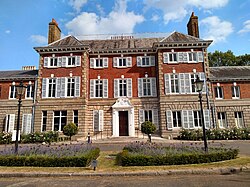Local authority for the London Borough of Richmond upon Thames
Richmond upon Thames London Borough Council, also known as Richmond upon Thames Council, LBRUT or Richmond Council, is the local authority for the London Borough of Richmond upon Thames in Greater London, England. It is a London borough council, one of 32 in London. The council has been under Liberal Democrat majority control since 2018. Although the borough is named after Richmond, the council meets at York House in Twickenham, and has its main offices in the adjoining Civic Centre.
History
The London Borough of Richmond upon Thames and its council were created under the London Government Act 1963, with the first election held in 1964.[5] For its first year the council acted as a shadow authority alongside the area's three outgoing authorities, being the municipal borough councils of Barnes, Richmond, and Twickenham. The new council formally came into its powers on 1 April 1965, at which point the old boroughs and their councils were abolished.[6]
The council's full legal name is the "Mayor and Burgesses of the London Borough of Richmond upon Thames".[7]
From 1965 until 1986 the council was a lower-tier authority, with upper-tier functions provided by the Greater London Council. The split of powers and functions meant that the Greater London Council was responsible for "wide area" services such as fire, ambulance, flood prevention, and refuse disposal; with the boroughs (including Richmond upon Thames) responsible for "personal" services such as social care, libraries, cemeteries and refuse collection. As an outer London borough council Richmond upon Thames has been a local education authority since 1965. The Greater London Council was abolished in 1986 and its functions passed to the London Boroughs, with some services provided through joint committees.[8]
Since 2000 the Greater London Authority has taken some responsibility for highways and planning control from the council, but within the English local government system the council remains a "most purpose" authority in terms of the available range of powers and functions.[9]
Since 2016 the council has shared a chief executive and other staff with neighbouring Wandsworth Council.[3]
Powers and functions
The local authority derives its powers and functions from the London Government Act 1963 and subsequent legislation, and has the powers and functions of a London borough council. It sets council tax and as a billing authority also collects precepts for Greater London Authority functions and business rates.[10] It sets planning policies which complement Greater London Authority and national policies, and decides on almost all planning applications accordingly. It is a local education authority and is also responsible for council housing, social services, libraries, waste collection and disposal, traffic, and most roads and environmental health.[11]
Political composition
The council has been under Liberal Democrat majority control since 2018.
The first election was held in 1964, initially operating as a shadow authority alongside the outgoing authorities until it came into its powers on 1 April 1965. Political control of the council since 1965 has been as follows:[12]
Leadership
The role of mayor is largely ceremonial in Richmond. Political leadership is instead provided by the leader of the council. The leaders since 1965 have been:[13][14]
Composition
Following the 2022 election and by-elections in January 2024, the composition of the council was:[15][16]
The next election is due in May 2026.
Elections
Since the last boundary changes in 2022, the council has comprised 54 councillors representing 18 wards, with each ward electing three councillors. Elections are held every four years.[17]
Premises
The council meets at York House, a large 17th century house in the centre of Twickenham.[18] The house had been bought in 1923 by the old Twickenham Urban District Council (predecessor of Twickenham Borough Council) and converted to become its headquarters.[19] In 1990 the council moved its main offices to a new purpose-built Civic Centre at 44 York Street, immediately west of York House.[20] The Civic Centre was partly built behind the retained Victorian façade of a parade of shops at the corner of York Street and Church Street.[21]




